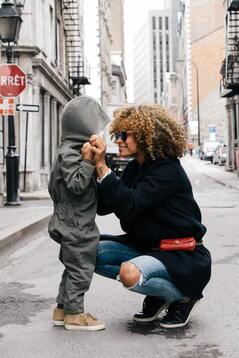|
Back to Blog
How Can I Show Love to my Child? Part 23/15/2022  Photo by Sai De Silva Photo by Sai De Silva In February's blog post, I mentioned how difficult it can be to show affection and love to our children as they get older. And to be clear, when I say get older, I´m referring to children who are no longer infants. Such children are now more vocal about their needs, expressive with their discontent and can reject us in ways that sometimes trigger us. In that blog post, I highlighted four games that focus on eye contact that can bring a sense of connection and joy between you and your child. Check it out here if you haven´t already read it. This month´s post will feature games that emphasize touch. Why is touch so important for a child and for us as human beings? Aside from the research that highlights how infants actually thrive when touched, nurturing touch allows us to feel connected and loved. Try to remember the last time you received a welcoming, embracing hug from your child or another loved one. Or the time you held your child's hand to stroll down the street. Or, how about the last time you got a high five or a fist pump with a proud energy behind it? These are the touches I'm referring to. They come with loving energy that helps us connect with each other. Unfortunately, however, these are some of the first things we can forget to do when life gets busy and our children become more independent. So, below are a few games/activities you can do to help foster this sense of connection. Test them out and feel free to let me know how they worked for you.
As in my previous post I will offer a word of caution: some children are sensitive to touch. For some, touch can be too ticklish which can dysregulate them. For others, the proximity of having someone close to them may be triggering. If you find your child is not playing along and instead tries to hit you or to turn it into a different game, it could be a sign that they are uncomfortable. Try instead the eye contact games I mentioned in my previous post or if you believe it is better, don't play at all. Stay tune for next month's post where I will be sharing activities that focus on words of affirmation. Thank you for reading. Subscribe to My Blog!Get the latest parenting blog posts delivered to your inbox! Thank you!You have successfully joined mysubscriber list.
0 Comments
Read More
Your comment will be posted after it is approved.
Leave a Reply. |
This Site is not intended to provide psychotherapy advice. The Site is intended only for use by individuals in search of general information of interest pertaining to anxiety, depression and related topics. Content is not intended to replace or serve as substitute for professional consultation or service. Contained observations and opinions should not be misconstrued as specific counseling advice.
